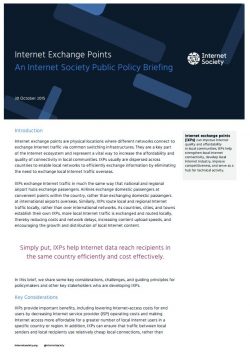Introduction
Internet exchange points are physical locations where different networks connect to exchange Internet traffic via common switching infrastructures. They are a key part of the Internet ecosystem and represent a vital way to increase the affordability and quality of connectivity in local communities. IXPs usually are dispersed across countries to enable local networks to efficiently exchange information by eliminating the need to exchange local Internet traffic overseas.
IXPs exchange Internet traffic in much the same way that national and regional airport hubs exchange passengers. Airlines exchange domestic passengers at convenient points within the country, rather than exchanging domestic passengers at international airports overseas. Similarly, IXPs route local and regional Internet traffic locally, rather than over international networks. As countries, cities, and towns establish their own IXPs, more local Internet traffic is exchanged and routed locally, thereby reducing costs and network delays, increasing content upload speeds, and encouraging the growth and distribution of local Internet content.
Simply put, IXPs help Internet data reach recipients in the same country efficiently and cost effectively. In this brief, we share some key considerations, challenges, and guiding principles for policymakers and other key stakeholders who are developing IXPs.
Key Considerations
IXPs provide important benefits, including lowering Internet-access costs for end users by decreasing Internet service provider (ISP) operating costs and making Internet access more affordable for a greater number of local Internet users in a specific country or region. In addition, IXPs can ensure that traffic between local senders and local recipients use relatively cheap local connections, rather than expensive international links. The cost savings can be significant—20 percent or more in some countries—as local traffic can make up a significant portion of an ISP’s overall Internet traffic.
IXPs create efficient interconnection points that encourage network operators to connect in the same location in search of beneficial peering arrangements, cheaper and better traffic exchange, and other information and communication services. The presence of an IXP also can attract out-of-country service operators. A single connection to an IXP provides out-of-country service operators with lower collective access costs to multiple potential local customers. Because of this, IXPs are uniquely able to encourage the development of a region’s communications infrastructure, including national and international fibre cables, and local datacentre development.
The impact of an IXP is dynamic and can be instrumental in developing the local Internet ecosystem. IXPs can attract a range of local and international operators, which then can trigger innovation and more business opportunities. In addition, IXPs can improve local users’ quality of access by providing more-direct network connections for local content producers and consumers. Experience shows that access speeds for local content can improve as much as tenfold with an IXP in place because traffic is routed more directly. IXPs can also improve the level of stability and continuity of access—their switching capabilities provide additional flexibility in redirecting Internet traffic when there are connectivity problems on the network. For example, if there is a breakdown in international connectivity, an IXP can keep local traffic flowing within the country.
Generally, IXPs are not expensive to start.. The cost of the equipment required to establish an IXP is usually minimal, making the establishment of an IXP an affordable local project. Under a sustainable funding and management model, ISPs and other network operators, which benefit from using IXPs, can often cover the initial start-up and monthly operating costs. When establishing an IXP, external assistance in the form of setup advice and training may be helpful, especially in the initial phase. There are organizations around the world that provide assistance to new and existing IXPs. [1]
History shows that there is a significant benefit to establishing IXPs with proper working guidelines and internal policies that have been cooperatively established by the prospective participants. Such internal agreements can ensure better distribution of benefits among participating operators, and can alleviate concerns about competition via neutrally agreed practices.
Finally, IXPs encourage local service hosting and local content development and applications. Once an IXP is established, it can create a local environment that attracts a variety of other services, including domain name servers, root-server mirrors, time servers, and content and Web caches. These localized services reduce connectivity requirements (bandwidth) and improve the speed and reliability of Internet access for local users. In addition, the improvements in access speed facilitated by IXPs often result in incentives for local developers to produce more relevant local content and applications. The presence of an IXP might encourage international content providers to establish themselves in a country. In-country content providers can offer consumers a better online experience because IXPs enable faster content-transmission speeds. Overall, these benefits to local content development and delivery make the Internet more socially and economically beneficial to a country, and assist in long-range connectivity planning as more local-content businesses develop.
Challenges
While the benefits of IXPs are clear, there are also practical challenges with respect to organizing and establishing IXPs.
> Collaboration and building trust. The establishment of an IXP requires the collaboration of many actors, many of whom are competitors that will be exchanging traffic at the IXP. Some operators might express initial reluctance to collaborate with potential competitors. Resolving this challenge involves building local Internet communities and trust among participants. In fact, most of the time and effort required to set up successful IXPs is spent developing trust, common understanding, and agreements within the local community. The technical aspects of the exchange are usually very simple, but because the relationship development between stakeholders is so important to a successful IXP, it is sometimes said that setting up an IXP is “80 percent social engineering and 20 percent technical engineering.”
> Neutral location and management. Best practices have shown that IXP location and management should be as neutral as possible and agreed upon by IXP participants. Ideally, the location of an IXP and an IXP manager/operator should be independent of outside commercial or governmental influences. Unfortunately, some incumbents and governments want to control all aspects of an IXP. When this happens, the IXP often fails, as confidence and trust in its management and operations is lost.
> Enabling environment. IXPs are sensitive to local constraints associated with the lack of an enabling Internet-connectivity environment, including investment and tax constraints, the high cost of local terrestrial fibre, and complicated rules for network deployment. Therefore, initiating IXPs and ensuring their efficient operation is not as simple as it seems, especially in markets where more communications liberalization has not taken place. Creating an enabling environment will only help facilitate a more robust overall Internet ecosystem and enable a stronger IXP environment.
> Not a universal solution. IXPs are not a universal solution to a country’s Internet challenges. They complement and improve the functioning of other parts of the Internet ecosystem by offloading local traffic from congested and more expensive international links, thereby creating opportunities for a competitive environment. They do not solve problems. Rather they demonstrate the untapped potential that could be unlocked by removing barriers, such as lack of competitively priced international or local capacity, nontransparent regulation, weak cross-border connectivity, international gateway monopolization, and the high cost of terrestrial fibre.
Guiding Principles
Government actors can play an active and critical role in championing the development of IXPs and removing roadblocks to their growth and success. Guiding principles for policy makers and regulators include:
> Support IXPs and speed their development with information and communications technology (ICT) policy objectives that promote an enabling environment for interconnection via policy and regulatory frameworks. [2]
> Provide as much policy and regulatory transparency as possible to encourage regional and international entities to participate in the local interconnection and peering environment.
> Encourage competitive access to wired and wireless connections, which will help lower the costs associated with connecting to an IXP.
> Promote local investment opportunities via tax holidays, and reduced duties on the equipment needed to build IXPs and operator networks (e.g., switches, routers, and servers). Provide clear guidance about local business rules and practices.
> Foster relationships with IXPs to learn more about local interconnection environments and the sustainability and technical management of an IXP.
> Work with existing IXPs and expert organizations to avoid the mistakes that other IXPs have made, obtain start-up assistance and equipment donations, and learn more about training and human-capacity development opportunities.
From an enabling-Internet-economic perspective, ensuring the presence of a local IXP has become an increasingly important priority. By ensuring better and more connectivity—particularly in less-connected areas of a country—IXPs can help develop the local Internet industry, improve competitiveness, and serve as a hub for technical activity. Experience shows that policy makers and other governmental stakeholders are important partners in IXP development. They play a vital role in championing IXPs, working with local stakeholders to strengthen the interconnection and peering environment, and promoting stakeholder dialogue and much-needed training. Policy makers who support their local technical community’s efforts to create an IXP are supporting competitive Internet-interconnection and traffic-exchange environment.
Additional Resources
The Internet Society has published a number of papers and additional content related to this issue. These are available for free access on the Internet Society website.
> Internet Society: Internet exchange point (IXP) Information Web page, http://www.internetsociety.org/what-we-do/issues/internet-exchange-points-ixps
> The Internet exchange Point (IXP) Toolkit and Best Practices Guide, http://www.internetsociety.org/ixptoolkitguide and www.ixptoolkit.org
> Promoting the Use of Internet Exchange Points: A Guide to Policy, Management, and Technical Issues, by Mike Jensen. http://www.isoc.org/educpillar/resources/docs/promote-ixp-guide.pdf
> Assessment of the Impact of Internet Exchange Points (IXPs): Empirical Study of Kenya and Nigeria, http://www.internetsociety.org/ixpimpact
> Connectivity in Latin America and the Caribbean: The Role of Internet Exchange Points, https://www.internetsociety.org/wp-content/uploads/2021/01/rpt-LACIXPvrt-201311-eng_0_0.pdf
> Report from the IGF Rio Best Practices Session Internet Traffic Exchange in Less Developed Internet Markets and the Role of Internet Exchange Points. http://www.isoc.org/educpillar/resources/docs/igf-ixp-report-2007.pdf
> Lifting Barriers to Internet Development in Africa: Suggestions for Improving Connectivity, http://www.internetsociety.org/doc/lifting-barriers-internet-development-africa-suggestions-improving-connectivity
Notes
[1] Organizations providing technical and training support to IXPs include: the Internet Society (ISOC), Network Startup Resource Center (www.nsrc.org), Packet Clearing House (www.pch.net), the International Telecommunication Union (www.itu.int), and the African Union Commission (www.au.int).
[2] Refer to the Internet Society online Interconnection information for a general set of guiding principles that enhance overall network interconnectivity ( www.internetsociety.org). Also refer to the report titled, “Lifting Barriers to Internet Development in Africa,” in the Additional Resources section.

